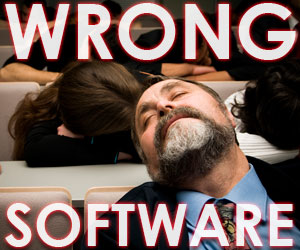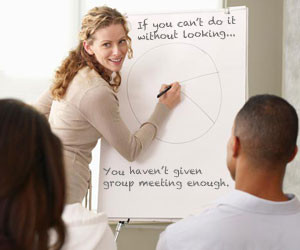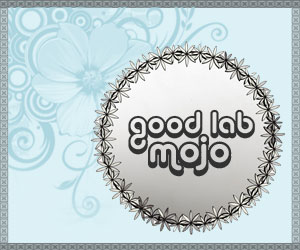 Communicating our work is one of the most important responsibilities of our job as scientists. Although traditional publication is one mechanism of sharing our findings, more commonly we’re called upon to present our research orally. Whether speaking at a small group meeting or a large international conference, the success of our talk may hinge on our ability to craft an engaging performance.
Communicating our work is one of the most important responsibilities of our job as scientists. Although traditional publication is one mechanism of sharing our findings, more commonly we’re called upon to present our research orally. Whether speaking at a small group meeting or a large international conference, the success of our talk may hinge on our ability to craft an engaging performance.
BenchLife
Being a scientist isn’t just about doing experiments, so neither are we. This is where we make breakthroughs beyond the bench for scientists.
Giving a Great Talk Begins With the Right Software
by
Lab Techniques Wordsearch: You Can Do Them, But Can You Find Them?
by
Exactly How Flexible is the Co-First Author Asterisk?
by
 Talk to any set of identical twins for the first time and at some point in the conversation you’ll undoubtedly ask whether they ever switched places in order to play a joke on their parents, teachers, girlfriends or boyfriends. While each set of twins may answer differently, they’ve usually drawn an ethical line somewhere in the sand as to how far they think it’s appropriate to take the undercover mission. In science, ask co-first authors whether they switch the author biline on their CV and the line in the sand might not be as clear.
Talk to any set of identical twins for the first time and at some point in the conversation you’ll undoubtedly ask whether they ever switched places in order to play a joke on their parents, teachers, girlfriends or boyfriends. While each set of twins may answer differently, they’ve usually drawn an ethical line somewhere in the sand as to how far they think it’s appropriate to take the undercover mission. In science, ask co-first authors whether they switch the author biline on their CV and the line in the sand might not be as clear.
Easiest Mac or Godey’s Ladies Meet Lady Ga-Ga
by
 No, I’m not going to leap out of the internet wearing slices of cheese held together with spaghetti (I know you’re breathing a sigh of relief.) I’ve combined a vintage recipe with electronics and half quixotic tricks to make a hypnotic dish!
No, I’m not going to leap out of the internet wearing slices of cheese held together with spaghetti (I know you’re breathing a sigh of relief.) I’ve combined a vintage recipe with electronics and half quixotic tricks to make a hypnotic dish!
Your Boss is Incompetent, But Could You Do Any Better?
by
 It has been said that in the workplace, people rise to their highest level of incompetence. In other words, individuals who are good at their job will likely be promoted, while average performance will be neither rewarded nor punished. So ultimately individuals will advance until they hold a position they’re incapable of properly performing and employees will be forced to deal the consequences of the boss’ inability. In an organization top-heavy with incompetence it should come as no surprise that employees are frustrated. But given the opportunity, could they do any better if they were running the show?
It has been said that in the workplace, people rise to their highest level of incompetence. In other words, individuals who are good at their job will likely be promoted, while average performance will be neither rewarded nor punished. So ultimately individuals will advance until they hold a position they’re incapable of properly performing and employees will be forced to deal the consequences of the boss’ inability. In an organization top-heavy with incompetence it should come as no surprise that employees are frustrated. But given the opportunity, could they do any better if they were running the show?
BenchFly Crossword: Back to Basics with Chemistry and Biology
by
 We thought what better timing than the beginning of the new academic year to brush up on the fundamentals of chemistry and biology. Or perhaps more appropriately – brush off the dust from those fading memories. But let’s be honest, who wants to crack open the textbooks on a Friday afternoon? Nobody. So today, we’re excited to kick off a new series at BenchFly – our Interactive Crossword Puzzle!
We thought what better timing than the beginning of the new academic year to brush up on the fundamentals of chemistry and biology. Or perhaps more appropriately – brush off the dust from those fading memories. But let’s be honest, who wants to crack open the textbooks on a Friday afternoon? Nobody. So today, we’re excited to kick off a new series at BenchFly – our Interactive Crossword Puzzle!
Pay It Forward with Good Lab Mojo Checks
by
Are You Prepared for the ‘Worst Case Scenario’?
by
A single event can forever change the trajectory of a scientific career. Most of us hope for the successful home run experiment that opens the door to a new field and transforms us from an average scientist into a superstar. Unfortunately, not all events are positive – just ask residents of the United States’ east coast who nervously endured the season’s first potentially lab-destroying hurricane. Better yet, ask the labs that were forced to permanently close their doors in the wake of Hurricane Katrina in 2005.
Confronted By Your Hollywood Boss
by
 Whether induced by the magic of grabbing our first pipette or the vapors from the ether bottle that was left open, many of us daydream about how our career in research will unfold. While the ending may vary, most fantasy scripts include completing graduate school in three years, curing a major disease, and winning a Nobel prize. But in our rush to bask in the glory of our own scientific greatness, one person is often neglected in our visions – our boss.
Whether induced by the magic of grabbing our first pipette or the vapors from the ether bottle that was left open, many of us daydream about how our career in research will unfold. While the ending may vary, most fantasy scripts include completing graduate school in three years, curing a major disease, and winning a Nobel prize. But in our rush to bask in the glory of our own scientific greatness, one person is often neglected in our visions – our boss.
Group Meeting: What’s the Point?
by
 In last week’s poll nearly 70% of readers felt that giving group meeting more than quarterly is a waste of time. While this certainly doesn’t sound like an extreme position to us, it’s clear that respondents’ answers were influenced by their definition of group meeting. If the goal of group meeting is to get help with the problems we’re facing in lab, then maybe monthly or even weekly informal meetings would make sense. Alternatively, if the purpose of group meeting is to practice giving formal seminars, then maybe giving two or three meetings a year is enough. So this got us thinking – What the heck is the point of group meeting anyway?
In last week’s poll nearly 70% of readers felt that giving group meeting more than quarterly is a waste of time. While this certainly doesn’t sound like an extreme position to us, it’s clear that respondents’ answers were influenced by their definition of group meeting. If the goal of group meeting is to get help with the problems we’re facing in lab, then maybe monthly or even weekly informal meetings would make sense. Alternatively, if the purpose of group meeting is to practice giving formal seminars, then maybe giving two or three meetings a year is enough. So this got us thinking – What the heck is the point of group meeting anyway?



